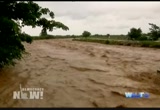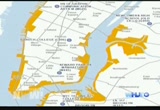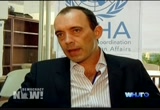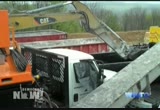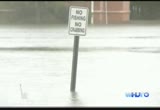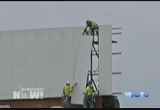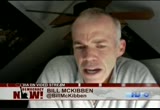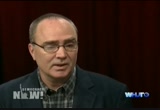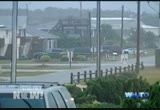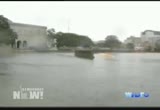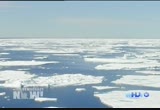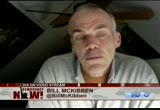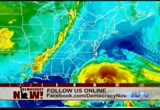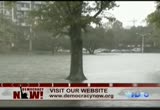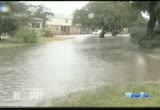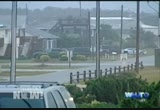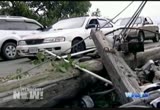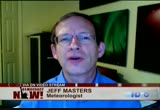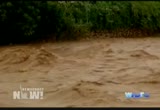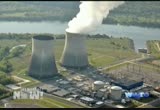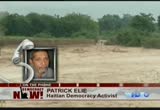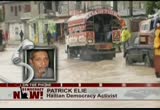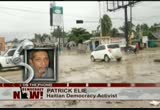tv Democracy Now WHUT October 29, 2012 6:00pm-7:00pm EDT
6:00 pm
democracy now!] >> from ashland, oregan, this is "democracy now!" >> this is a serious and big storm. my first message is to all people across the eastern seaboard, mid-atlantic to the north, that you need to double- >> the superstar arrives. tens of millions of people from carolinas to boston brace for hurricane sandy, possibly the largest room to ever hit the u.s. mainland. will speak with, scientist greg jones, meteorologist jeff masters and writer and activist bill mckibben on the connection between global warming and hurricanes. >> the basic physical property here is the warm air holes or
6:01 pm
water vapor than cold. you can get stronger storms. the atmosphere is about 4% 12 than it was four years ago. that is an enormous change. it loads the dice for drought and they lose and downpour and flood. that is what we're seeing all over the planet. >> we will go to haiti where hurricane sandy killed at least 50 people, devastating parts of the country still recovering from the 2010 earthquake. and we will look at the storm's impact on the nuclear industry. at least 16 nuclear plants are in the path of this unprecedented storm. all of that and more coming up. this is "democracy now!," democracynow.org, the war and peace report. i'm amy goodman. we are broadcasting from
6:02 pm
medford, oregon. much of the east coast is shut down today as residents brace for hurricane sandy, a massive storm that could be the most powerful to hit the united states in decades. hundreds of thousands of people have already been evacuated, millions could lose power over the next day. meteorologists say it is rare hybrid superstorm greeted by a jet stream wrapping itself around a tropical storm, creating what to be the largest hurricane ever to hit the u.s. mainland. on sunday, president obama urged east coast residents to take the storm very seriously. >> this is a serious and big storm. my first message is to all the people across the eastern seaboard, mid-atlantic to the north, you need to take this very serious and follow the instructions of your state and local officials because they're
6:03 pm
going to be providing you with the best advice in terms of how to deal with this storm. >> the storm has already killed 66 people in the caribbean, where battered haiti and cuba. in haiti, a top u.n. relief official warned of a heightened risk of a new outbreak of waterborne disease. >> so the entire southern peninsula, including the province [indiscernible] has been heavily affected with flooding, rivers have burst out of their banks, canals running through port-au-prince. what we fear most is that there might be spikes in waterborne diseases, especially cholera, which we always see after
6:04 pm
flooding and rain in haiti. >> new york is among many states to close schools and transit systems in preparation for the storm. it the entire new york subway system is being shut down for the second time in 14 months after no previous instances. the new york stock exchange is also closed in its first unscheduled shutdown since 2001. on sunday, the new york city mayor michael bloomberg ordered the evacuation of tens of thousands in low-lying areas. >> in light of these conditions, i'm going to assign an executive order mandating evacuation of some areas. i am also ordering all of the city's public schools be closed on monday. first as to the evacuations. we are ordering this evacuation for the safety of approximately 375,000 people who live in these areas. if you live in these areas, you should leave them this afternoon. >> with just over a week before
6:05 pm
the election, but president obama and republican challenger mitt romney have scaled back campaigning as hurricane sandy approaches. the two campaigns have cancelled a combined 17 events and suspended fundraising emails in states that lie in the storm's path. on saturday, president obama rallied supporters in new hampshire, where he criticized romney's record as governor of the neighboring massachusetts. >> during governor romney's campaign down there, he promised the same thing he is promising now. he said he would fight for jobs and middle-class families. but once he took office, he pushed through a tax cut that overwhelmingly benefit 278 of the wealthiest families in the state, and then he raised taxes and fees on middle-class families to the tune of $750 million. does that sound familiar to you? >> appearing in ohio, romney rallied supporters by invoking
6:06 pm
the mantra of a fictional football team depicted in the television drama "friday night lights." >> there is a fictional football team that used to be on tv, and as the team would go out of their locker room often facing a daunting team there would touch a sign that said, clear eyes, full hearts, can't lose. you have seen it. and that is how i feel about ohio. you have clear eyes, and full hearts, and on november 6, we cannot lose with your help. we are taking back america. >> at these four people were killed sunday when u.s. drones struck northern yemen. the victims were alleged militants, the u.s. policy is to deem any adult age male targeted by drones as a militant unless proven otherwise after they're killed. it was the fourth known u.s. drone strike inside yemen this month. violence is continuing unabated
6:07 pm
in syria despite an international ceasefire brokered late last week. on sunday, syrian activists said at least 16 people, including seven children, were killed when government warplanes bombed residential areas in the province of idlib. ariel attacks were also reportedly launched on eastern suburbs of the capital damascus. the top united nations investigator on palestinian human rights is calling for a boycott of all companies linked to settlements in the occupied west bank. the special rapporteur on human rights in the palestinian territories confirms the oldest firms including hewlett packard, a volvo and caterpillar are complicit in the israeli occupation. >> this is an attempt to reach out beyond the intergovernment international institutional systems and one of the things that our report recommends is
6:08 pm
encouragement of the boycott of these named corporations, and encouragement of civil society actors to join in that boycott. >> the obama administration has rejected this proposal, calling it "irresponsible and unacceptable." planned parenthood has filed a new lawsuit challenging a funding ban in texas that seeks to exclude it from a program for low-income women. the texas program offers cancer and health screenings as well as birth control services to some 130,000 women, about 40% of whom are served through planned parenthood. but texas governor rick perry has sought to bar planned parenthood's involvement because the group also provides abortions. an appeals court upheld the ban last week, but on friday, a texas judge issued a temporary standing order pending arguments in a new challenge from planned parenthood. attorneys for planned parenthood
6:09 pm
said the ban is illegal because it would force texas to lose 90% of the program's funding from the federal government. a coalition of environmental groups has asked the epa to subject oil and gas extracting companies to the same emissions oversight as other energy industry sectors. the environmental integrity project -- the lead organization behind the request -- says companies, especially those that conduct fracking, should have to report their emissions to the toxic release inventory, or tri. in a statement, the group said -- the request comes on the heels of recent studies alleging increased health risks in communities exposed to fracking. a survey by earthworks of residents in 14 pennsylvania counties found that fracking has led to 80% increase in sinus
6:10 pm
problems and 70% increase in throat irritation. a recent u.s. geological survey study in wyoming found that fracking chemicals have again been found in the groundwater of the town of pavillion, affirming the conclusion of an epa study last year. a leading pakistani politician and campaigner against u.s. drone attacks was detained and questioned over his political views on friday while trying to enter the u.n. states. imran khan says he was taken off a flight from toronto to new york and interrogated by u.s. agents about his public opposition to drones. announcing the incident after his questioning, imran khan tweeted -- "my stance is known. it drone attacks must stop." earlier this month, imran khan led a march of thousands of people in pakistan to rally against the drones.
6:11 pm
he is running for president in pakistan. those are some of the headlines. this is "democracy now!," democracynow.org, the war and peace report. i'm amy goodman. on the road in medford, oregon, broadcasting from southern oregon's public television. much of the east coast is shut down today as residents prepare for hurricane sandy, a massive storm that could impact up to 50 million people from the carolinas to boston. new york and other cities have shut down schools and transit systems. hundreds of thousands of people have already been evacuated. millions could lose power over the next day. the storm has already killed 66 people the caribbean where it battered haiti and cuba. meet urologists say sandy could be the largest ever to hit the u.s. mainland. while not as powerful as hurricane katrina, the storm stretches a record 520 miles from its eye. earlier this morning, the
6:12 pm
national hurricane center said the hurricane's wind speed increased 85 miles per hour with additional strengthening possible. describing it as a rare hybrid superstorm, forecasters say sandy was created by an arctic jet stream wrapping itself around a tropical storm. the storm could cause up to 12 inches of rain and in some areas, as well as up to 3 feet of snowfall in the appalachian mountains. flooding has also expected to be a major problem. the national weather service has warned of record level flooding and life-threatening storm surges in coastal areas. the nuclear regulatory commission has announced it is taking special precautions for the storm. there are at least 16 nuclear reactors located within the path of the storm. six oil refineries are also in the storm's path. while the news media have been covering hurricane sandy around the clock, little attention has been paid to the possible connection between the storm and climate change.
6:13 pm
scientists have long warned how global warming would make north it planned to hurricanes more powerful. just two weeks ago, the proceedings of the national academy of sciences published a major study on the connection between warmer sea surface temperatures and increase in stronger atlantic hurricanes. but the report said -- we begin today's show with two guests. it with me in oregon we're joined by greg jones, a climate scientist and professor of informal studies at southern oregon university in ashland. and joining us by videostream is bill mckibben, co-founder and director of 350.org. he is author of numerous books including, "eaarth: making a life on a tough new planet." on november 7, 350.org is launching a 20-city nationwide tour called "to the map" to
6:14 pm
connect the dots between extreme weather, climate change, and the fossil fuel industry. we welcome you both to "democracy now!" let's start with bill mckibben. you just made it back to your home in vermont. can you talk about the significance of what the east coast is facing right now. >> i think the first thing is this is a storm of really historic proportion. it is like something we have not seen before. it is half the size of texas. it is coming across with water that is near record warmth as it makes its way up the east coast. we're seeing lower pressures north of cape hatteras than ever have been recorded before. the storm surge, which is going to be the very worst part of the storm, is being driven by that huge size and expense of the storm, but it comes in on water that is already somewhat higher
6:15 pm
than it would have been in the past because of sea level rise. it is a monster. frankenstorm, frankly, is not only a catchy name, it is the right name. this thing is stitched together from elements, natural and unnatural. it seems poised to cause real havoc. the governor of connecticut yesterday said, the last time we saw anything like this was never. i think that is about right. >> there certainly was a lack of discussion, to put it mildly, in the presidential debates around the issue of climate change. >> how do you think romney is feeling this morning for having the one mention his made the whole time, his big laugh line the republican convention was how silly it was for obama to be
6:16 pm
talking about slowing the rise of the oceans? i think that wins pretty much every prize for irony right now. there has been a pervading climate silence. we were doing our best to break that. yesterday afternoon, there was a demonstration in times square , a timesdot to connect the dots with -- a giant dot to connect the dots there is a vigil to try to get the senate candidates to address the issue with, change. it is incredibly important that we not only, first party is people safety and assisting relief efforts in every possible way, but it is also important that everybody, even those who are not in the path of this storm, reflect about what it means to have the warmest year in u.s. history when we as in the warmest month, july, of any
6:17 pm
month in a year in u.s. history, in the year when we saw, essentially, summer sea ice in the arctic vanished before our eyes. what it means now that we're seeing storms of this unprecedented magnitude. if there ever was a wake-up call, this is it. >> let me play the clip you are referring to of mitt romney at the republican convention in tampa. >> president obama promised to begin to slow the rise of the oceans. [laughter] [applause] and to heal the planet. i promise is to help you and your family. [applause] >> that was mitt romney at the
6:18 pm
convention. at the republican convention. but when it came to the presidential debate, neither nor mitt romneyeyvobama brought up climate change. i want to bring in greg jones,, is a professor of internal studies at southern oregon university in ashland. the connection between the super storm we are seeing and climate change? >> this is a fairly unique event. i kind of worried as the, to set these type of unique events are clearly more frequent. we have the conditions that produce something that could be very damaging to the nine states. i often wonder why we do not seem more of that. the question today is, where we are in terms of our climate science the understanding of these things, the rarity of this event is what makes it very unique. i think all of the conditions came together to produce a
6:19 pm
superstorm. we have had a few that have been close to this. given the number of people involved and located, it is a very problematic event. >> bill mckibben, what you think has to happen? you have been traveling the world, warning people, working with organizations around the issue of climate change, do you feel like the kind of organizing your doing has in effect? i mean, you see these three presidential debates, tens of millions of people watch them, this sort of define the discourse in this country and yet not raised -- not only the candidates do not raise them, the reporters who are the moderator's of these debates do not raise the issue. >> where it begins the most powerful and rich as industry on earth, and the status quo is -- they want nothing to change. until we are able to force them
6:20 pm
to the table, as it were, very little will happen in washington or elsewhere. that is why we launched this huge tour beginning the night after the election. not coincidentally, in seattle, and continued around the country. you can find out about it at math.350.org. the the fossil fuel industry keeps pouring carbon into the atmosphere and we keep seeing this kind of event, or we take some action. here's the thing to remember. the crazy changes we're seeing now, the fact we broke the arctic this summer, the fact the oceans are 30% more acid, that all happens when you raise the temperature of the earth one degree. the same scientists who told us that was going to happen or call to the temperature will go up 4 degrees, maybe five unless we get off coal and gas and will very quickly. to do that, you know, it is nice
6:21 pm
to talk to washington, the insert was, washington has turned into a customer service for the fossil fuel industry. it is time to take on the industry directly. not time today. time today is to take care of people all up and down the east coast, to work in the relief efforts, to get the message out as this storm heads north. we in vermont, we know from last year's superstorm, we're pretty good idea of just how traumatic this is going to be. so the short-term effort is all about people. but the slightly longer-term effort is to make sure we are not creating a world where this kind of thing happens over and over and over again. >> bill, you mention the storm is made up of elements both natural and unnatural. what do you mean? >> global warming does not cause hurricanes. we have always had hurricanes. hurricanes are caused when a tropical wave comes off the
6:22 pm
coast of africa and moves on the warm water and the wind shear is low enough to let it form a circulation, and so on and so forth. but we're producing conditions like record warm temperatures in seawater that make it easier for this sort of thing, in this case, to get up the atlantic a head of steam. we are raising the sea levels. when that happens, it means whatever storm surge comes in, comes in from a higher level than it would have before. we are seeing -- there are a meteorologists saying that things like the huge amount of open water in the arctic have been changing patterns, a big wind current patterns come across the continent that may be contributing to these pressure areas we are seeing. to make, at this point, it is
6:23 pm
still mostly speculation. what is really different is there is more moisture and more energy in this narrow envelope of atmosphere. and that energy expresses itself in all kinds of ways. that is why we get these record rainfalls now, time after time. last year, it was irene and then lee directly after that. this storm they are saying could be a 1000 a share the mid atlan. i think that means more rain than you expect to see in 1000 years. i would be willing to bet that it will not be long before we see another one of them because we are changing the odds by changing the earth. one thing for all of us to remember, even as we deal with it on the east coast, this is exactly the kind of order people will be dealing with all over the world. 20 million people were dislocated by floods in pakistan two years ago.
6:24 pm
there are people with fears about what other nations will survive the rise of sea level. we're seeing horrific trout not just in the midwest, but much of the rest of the world. this is the biggest thing that has ever happened on earth, climate change. and our response has to be the same, and the two. >> bill mckibben, what are you waiting until after the presidential election to have your 20-city tour raising the issue? >> we have been involved as we can be in the political fight, but we don't want this issue to go away when elections are over. even a barack obama wins, we do not want everyone to be -- well, he will take care of it. that is what happened four years ago. what we want is for no matter who wins and no matter who is in the senate or house, we want to put the fossil fuel industry
6:25 pm
front and center and put real pressure on them in. we're going to try to launch a divestment movement that looks like the one around south africa a quarter-century ago. we will be bringing home the math i described. a piece in "rolling stone" with a viral, explaining the fossil fuel industry already has five times more carbon in its inventory and even the most conservative government thinks would be safe to burn. every day they go out looking for more. this is a rogue industry now. if sandy is a road storm, then exxon is a rogue industry. in their inventory alone, they have more than 7% of the carbon necessary to take us past two degrees. there are out lost out against the state, but laws of physics. you begin to see the results of that when you look around events like today's.
6:26 pm
>> bill mckibben, thank you for being with us pretty quickly, how are people in vermont preparing? when hurricane irene head, it ended up not being a very big deal in new york. but it ended up being a massive catastrophe where you -- for your state, vermont. >> to lose power and have strong winds, suffers the, there were those of us in vermont that were almost psychologically, you know, we really, year later, do not need to be the center of the store. we do not wish it on anybody else, but physically and psychologically, vermont it has barely recovered from irene. with some incredible sense of sympathy for the people who are getting hammered hardest by cindy this time around. >> thank you, bill mckibben, for being with us, founder of
6:27 pm
6:29 pm
>> this is "democracy now!," democracynow.org, the war and peace report. i'm amy goodman. we're on the road in medford, oregon, as southern oregon public television. the story today is on the east coast as we continue our coverage of hurricane sandy, a massive storm that could impact up to 50 million people from the carolinas to boston red new york and other cities have shut down schools and transit systems. hundreds of thousands of people have already been evacuated. millions could use -- this power over the next day. we continue with greg jones, a climate scientist, a professor of environmental studies at southern oregon university in ashland. joining us by videostream is jeff masters, director of meteorology at the weather underground. that was just bought by the weather channel. jeff masters, welcome to "democracy now!" can you explain what is happening right now on the east
6:30 pm
coast? >> we have got a caribbean hurricane that formed last week, moved northward through the bahamas. it is offshore the coast of virginia. it has maintained its hurricane strength. it has 85 opera hour winds, starting to accelerate toward the coast. the wintertime low pressure system starts to suck it and read the scale of the system is remarkable. the u.s. has never seen the sort of a large storm or you have winds that a tropical storm force, about 900 miles in diameter, and the radius of 12- foot seas surrounding the storm is more than 500 miles. over 1,100 mile diameter area, just a massive storm. it deserves the label "superstorm." >> what is the death toll so far? >> last i saw it was about 65. 11 were in cuba, which is very good about their disaster
6:31 pm
preparedness. that is an unusually high death toll for them. the majority of the deaths were in haiti, where they do not have as good a public response system and because of the deforestation that has gone on and the poverty and the earthquake two years ago. >> what you think of the preparations for this storm? >> in the u.s.? i think people are getting the message, whether they act on it or not i don't know. this part of the world where it is getting hit does not have a lot of storm experience. we did have hurricane irene last year, but that fizzled out a little ride before landfall and we did not get as high storm surge is expected. storm surge is the most dangerous part of the hurricane, typically, and going to an area that it does not have much experience with this sort of event this will be a one-100 or 1-200 event. record stores surge is already along the coast of new jersey.
6:32 pm
it will get much worse tonight. >> can you compare this hurricane to irene? >> sure. hurricane irene brought about a 9.5-foot storm tied to new york city, sandy is expected to bring a foot higher than that, which could potentially flood the subway system. irene had hire rain print this form will have about 30% less rainfall. you not to the kind of catastrophic rainfall flooding damage we saw with irene, which amounted to something like $16 billion. in part because the soil is dry air, rivers are lower right now because of a little bit of drought condition in the northeast. the rain will not be as big of an issue. the wind will be a huge issue because it will affect a massive amount of coastline, again, over 500 mile stretch could see when
6:33 pm
in excess of probably 50 miles per hour. with trees having leaves on them, you'll see a lot of tree damage, a power failure. it is expected over 10 million people will expect variants dollars will experience power failure. >> can you talk about climate change and whether it makes this storm more destructive? >> whenever you add more he to the ocean, he had more energy for destruction. and hurricanes, they pulled heat out of the ocean and converted to the kinetic energy of their wins. the approximately one degree fahrenheit warming of the ocean in the past century, directly increases the wind of hurricanes. that is of concern because if you have a 5% increase of hurricane wind, it does not translate to a 5% increase in damage. the damage of the wind goes by power. like the second or third power. so a 5% increase in wind causes
6:34 pm
a much higher degree of wind damage. that is the main thing as far as the heating of the oceans goes, about the effect on hurricane. yet the thing to think about, when he that the oceans more, you extend the length of hurricane seasons. there is an ample evidence that hurricane seasons are getting longer. it starts earlier, in slater. you're more likely to get late october storms now. you're more likely to get this sort of situation where a late october storms heats up with a winter low pressure system and gives us this ridiculous, nation and a nor'easter and hurricane that comes ashore, bringing all kinds of destruction. >> were you disappointed, jeff masters, in the three presidential debates that tens of means of people were watching, the issue of climate change did not arise? >> absolutely. climate change has become the
6:35 pm
new baltimore of our times, that which cannot be named. -- voldermort of our times, that which cannot be named. i see superstorm sandy as a wake-up call a week before the election writ politicians, the attention of this. we are expressing an unusual number of rear mitterrand to call events and they're probably not all due to a grand variations in the weather. we expect extreme events of this nature to increase in the future and we should be paying attention to the fact we have had a very large number of these billion dollar disasters in recent years. >> i am wondering, greg jones, a climate scientist here the southern oregon university in ashland, did you find the same kind of silence are around the issue of climate change?
6:36 pm
>> sure. right now it is sad to see all of our political entities [indiscernible] it is not electable issue. not until the public sees it as important to demand from both parties. it is unfortunate. i see it in my students. until the times of damage that a hurricane like this system bring, i do not think people wake up enough and see those kinds of issues as being directly tied to what we do in the fossil fuel industry in terms of changing the climate, changing the surface of the earth and attention. they are problematic issues, and the party is just are not there with them. >> you look at climate change affects on winery's? >> i've been setting how it affects agriculture for years. my main area of study is looking how it is growing grapes and
6:37 pm
making wine. it is an important issue, but very frivolous when compared with the east coast right now. but all crops have a very fine clement niche role to to their surroundings. small changes in climate can completely change coffee, pineapples, chocolate, wine, any of these types of specialized crops that we grow. plus, it has an issue for broadbased crops, whether or not they are soybean, corn, etc. >> is a serious issue when you are talking a term that many people do not talk about in the u.s., climate refugees, when food becomes scarce because of climate change. >> we have some serious issues with dealing with this. many of our crops, you take rice grown in southeast asia, feeding the largest population on earth.
6:38 pm
small changes in monsoonal rainfalls could bring about disaster. so just small changes, i think, is very important as we look at thesthe cross system. when we talk about what we do daily and seasonally as humans, small changes in, do not mean a lot. but when it impacts our food systems and how they're produced, that is where we have real problems. >> i want to ask you, jeff masters, about geoengineering, as well, greg jones. naomi klein had a fascinating piece yesterday in "the new york times." she talked about being on british columbia shoreline, the sunshine coast, and seen orcas in the water, killer whales, and it shocked by this extremely rare visits but she said, the possibility did not occur to me until 26 ago when i read reports
6:39 pm
of a bizarre social experiment off the island's. several hundred miles from where we spotted the orcas swimming. an entrepreneur dumped 120 tons of iron dust off the hull of a rented fishing boat. the plan to create an all too plan that would sequester carbon, thereby, combat climate change. she goes on to say, mr. george is one of a growing number of would-be geoengineering to advocate higher risk, large- scale technical intervention that would fundamentally change the oceans and skies in order to reduce the effects of global warming. in addition to mr. george's scheme to fertilize the ocean with iron, other geoengineering strategies under consideration include pumping sulfate aerosols into the upper atmosphere to imitate the cooling effects of a major volcanic eruption and brightening clouds so they reflect more of the sun's rays back to space. and she goes on to say, the
6:40 pm
risks are huge. ocean fertilization could trigger dead zones of toxic time, multiple simulations have predicted mimicking the effects of a volcano would interfere with monsoons in asia and africa, potentially threatening water and food security for millions of people. jeff masters, your response? and then greg jones. >> it is a high risk sort of thing. it is quite controversial. we don't know how we are affecting the climate now, as a yet another element of risk by deliberately modifying it. we should definitely do a lot more study before we do any sort of real implementation with geoengineering scheme. i do think we should study it. we may get desperate enough we have to do it. i called geoengineering a bad idea. when you're down two touchdowns late in the fourth quarter, sometimes you got to throw deep. it is a terrible gamble and it will cause an expected effects,
6:41 pm
including a drop shift and rainfall patterns, but if a civilization is going to collapse because of what we're doing to the climate, maybe we need to consider these things. not in the near future, but down the road in a few decades. >> now decline asks, what are the resolutions? she said, wouldn't it be better to change our behavior before we begin fiddling with the planets basic life-support systems? >> jeff is correct. i think these are measures we are looking at because we have not approached it in the best possible way. but geoengineering, there's a tremendous number of different potentials there. the problem typically is scaling it up to something that is going to be effective at the global scale that doesn't cause any other ramifications into whatever system is, whether it is the oceans or atmosphere or the surface of the earth. we need to do the studies, i
6:42 pm
think, the find out what is going to be the most effective strategy is in geoengineering. but it is a real challenge to these types of research projects when we know the outcomes, probably are not scalable to the global scale. >> we're going to take a break. when we come back, we will go to haiti. thank you, greg jones, climate scientists at southern university. i also want to thank jeff masters for being with us from michigan. jeff masters runs weather underground, which was just bought by the weather channel. we will continue to follow what is taking place on the east coast and deal with the issue of climate change. we will be back in a moment. ♪ [music break]
6:44 pm
>> this is "democracy now!," democracynow.org, the war and peace report. i'm amy goodman. as we continue our coverage of hurricane sandy, the nuclear regulatory commission has a acknowledged the massive storm could impact coastal and inland nuclear plants. at least 16 plants are in the storm's projected path, including north and and sandy,
6:45 pm
hope creek and salem in new jersey, indian point in new york and millstone in connecticut. so far, there have been no reports of reactors shutting down despite operating under licenses that require them to do so if weather conditions are too severe. the nuclear regulatory commission met on sunday to discuss the precautions needed to secure vulnerable plants during the storm. a spokeswoman said -- for more we go now to burlington, vermont, to speak with arnie gundersen who is cord into projects at 70 nuclear power plants around the country. his chief engineer at fairewinds associates. welcome to "democracy now!" talk about what you are concerned about. >> thank you for having me. the key here is when a uranium
6:46 pm
atom splits, that only gives off about 95% of power. so when these plants shut down, 5% of the power is still going to come out of the power plants after they are shut down. i think the industry should preemptively shut down plants in the storm's wake, but it is not going to solve the entire problem. it is really likely that the electric grid that is out there will collapse, and these plans will become islands. electric islands. they will have to rely on the diesel generators to provide power. a bunch of these plants are in refuelings right now. when you are in a refueling outage, you're not record have all of your diesels running. you could be tearing apart one and only have one diesel available. so the concern is, should they lose offsite power, all of this heat needs to be removed and you
6:47 pm
are relying on just one diesel to keep the nuclear reactor cool. >> can you talk about what you feel needs to happen right now? and talk about nuclear power plant in connecticut and vermont, your main concern. >> the biggest problem, as i see it right now, is the oyster creek plant, which is oin new jersey. it appears right about the center of the storm. oyster creek is the same design, the even older, then fukushima dai-ichi unit 1. it is in a refueling outage. that means all the nuclear fuel is not in the nuclear reactor, but in the spent fuel pool. in that condition, there is no backup power for the spent fuel pool. if oyster creek or lose its offsite power, frankly, that is likely, there would be no way to
6:48 pm
cool that nuclear fuel that is in the fuel pool until they get the power reestablished. nuclear fuel pools do not have to be cooled by diesels for the old nuclear regulatory commission regulations. i hope the nuclear regulatory commission changes that and forces the industry to cool its nuclear fuel pools as well. this time of year, there's a lot of power plants and revealing outages. all of those plans will be in a situation where there is no fuel in the nuclear reactor. it is all in the fuel pool. systems have been shut down to be maintained, including diesel s, perhaps even completely dismantled, and in the event there is a loss of offsite power from the high wind from this hurricane, we will see the water in the fuel pools begin to heat up.
6:49 pm
>> a representative of the u.s. nuclear regulatory commission said these plans have to be able to withstand all sorts of natural phenomenon -- earthquakes, severe flooding, tropical storms, lightning storms, tornadoes. we like to say they're very robust structures back into with a lot of punishment, but the the same time the procedures in place to guide them through this. arnie gundersen, what is your concern? >> this is not like the big bad wolf that can huff and puff. they will not blow this plant down, especially a hurricane that is only 85 opera hour wind. it is not a question of the winds from this hurricane blowing the plant down. it is a question of the loss of offsite power. that is exactly what happened after fukushima dai-ichi. the earthquake destroyed the offsite power. at that point, the nuclear plant
6:50 pm
relies on its diesels. my big concern is diesel reliability and the fact that nuclear plants do not have to cool their nuclear full -- yuel pools with diesel per the regulations. >> tell us what is happening in vermont. tell us what is happening with vermont yankee, arnie gundersen, a plant you know well. >> irene hit a vermont yankee pretty hard. we are expecting a little less rain from sandy then from irene. what is interesting, talking about the law of an anticipated consequences, there was so much flooding in vermont that large gas canisters that people had in their backyards to heat their homes or heat their trailer parks or he their barbecues with a floating down the connecticut
6:51 pm
river and bumped into a hydroelectric dam, just south of vermont yankee. the state police actually blocked off the road heading into vermont yankee because they were afraid the hydrogen in those canisters were likely to explode. that is not in the design bases of a nuclear plant. nobody ever thought that we would have to worry about explosive gases floating down rivers by our nuclear plants and potentially causing damage. here in vermont, i think we will have less severe event near our nuclear plant than we had last year. but it really depends on the degree of the flooding. >> what are the most important issues we can learn from fukushima right now in the united states? and how does climate change been? >> climate change has affected
6:52 pm
nuclear plants this year. quite a few had to reduce power in the summer because river flow rates had dropped and there wasn't enough water to cool them. that happened in france and around the world as well. so we portray nuclear power as a way to eliminate climate change, but in fact, we need to solve climate change before we can have a nuclear power plants because there's just not enough cooling water to cool these plants in the event of hot summers. in the fall, and a lesson from fukushima dai-ichi, is the nuclear fuel pools are a major liability. there is more nuclear the less there is more cesium in the fuel pool and vermont yankee than ever exploded in all of the 700 above-ground bomb testing. i think the most important lesson we can take out of the fukushima dai-ichi and climate change and a special with
6:53 pm
hurricane sandy is that we cannot expect to cool these feeling pools. we need to remove the fuel, put it elsewhere and get it down from these fuel pools, get it down on to the ground in dry cask storage. the nuclear regulatory commission is not insisting on that because it will cost a couple billion dollars for the industry. >> arnie gundersen, i want to turn south for a moment to patrick elie, a pro-democracy activist in port-au-prince, haiti. the death toll in haiti is the worst of any place right now as a result of the superstorm. patrick, welcome to "democracy now!" can you describe what has happened in haiti was to mark what are the effects of the storm? i'm going to see if we're able to get him on. we keep losing and through the show. >> it has been devastating, even
6:54 pm
though the eye of the storm did not go through haiti but dumped a lot of rain, especially on the western area in the southern peninsula. given the vulnerability of the haiti environment, it is greeted tremendous devastation -- created tremendous devastation. roads have been destroyed, whole villages have disappeared. it is a pretty serious situation. >> the storm left a trail of destruction in making its way to the eastern seaboard in the
6:55 pm
united states, already leaving jamaica, cuba, haiti, government officials reporting 65 storm related deaths across the caribbean, 51 in 80, which had three days of continuous rainfall that ended only on friday. flooding has ravaged the southwestern areas of your country of haiti. this is the head of the united nations office for the coronation of humanitarian affairs in haiti. >> peninsula, including the province which has been heavily affected. flooding rivers have burst their banks. the canals running through port- au-prince because port-au-prince lies in the valley is surrounded
6:56 pm
by hills. >> we fear most is that there might be spikes in waterborne diseases, especially cholera, which we also -- always see after flooding rains in haiti. >> the death toll may clearly rise in haiti, which is still suffering from the effects of tropical storm isaac, which battered the country in late august, resulting in heavy flooding were some 400,000 survivors of the 2010 earthquake still live in camps. i saw you, patrick elie, in haiti after the earthquake. what about this coming together of these crises over the last years? >> as you said, it has been a string of crisis for which i think no one can be held responsible, but certainly, the way the crisis has been handled has been less than optimal.
6:57 pm
for example, you mentioned the refugees, the people in the camps. what this government has done is cleared the camps that were most visible. it was mostly a cosmetic affair. nobody knows what happened to these people who were in the main squares. they have been removed from eyesight, but to go to what kind of life? that does not seem to preoccupy the authorities. to come back to sandy, nobody can hold the government responsible for the vulnerability of haiti, but certainly, this is a government that has done all it could to
6:58 pm
create a political and social tension in the country. and that weakens us to face this new challenge. i think that is the main obstacle. also, you have to realize that already, people were starting to protest the way this government has been handling the affairs of this country. and now it is going to get only worse because this is a government -- >> patrick elie, we have to leave it there. patrick elie, speaking to us from haiti,, arnie gundersen speaking to us from vermont. democracy now! is looking for feedback from people who appreciate the closed captioning. e-mail your comments to outreach@democracynow.org or mail them to democracy now! p.o. box 693 new york, new york 10013. [captioning made possible by democracy now!]
166 Views
IN COLLECTIONS
WHUT (Howard University Television) Television Archive
Television Archive  Open Access
Open Access  Television Archive News Search Service
Television Archive News Search Service 
Uploaded by TV Archive on

 Live Music Archive
Live Music Archive Librivox Free Audio
Librivox Free Audio Metropolitan Museum
Metropolitan Museum Cleveland Museum of Art
Cleveland Museum of Art Internet Arcade
Internet Arcade Console Living Room
Console Living Room Books to Borrow
Books to Borrow Open Library
Open Library TV News
TV News Understanding 9/11
Understanding 9/11
